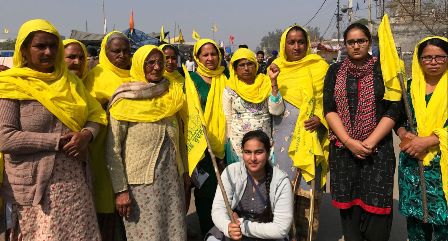Repeal of Farm Laws Vindicated Farmers’ Protest; Says MAKAAM
While supporting all the demands raised by SKM in its recent statement welcoming the repeal of the laws, MAKAAM believes that addressing the concerns of women farmers across marginalised sections calls for several structural reforms.
Modi government’s promise to repeal the three farm laws in the forthcoming winter session of the Parliament vindicated the historic protest of the farmers who refused to back down, even in the face of adversity, said MAKAAM (Mahila Kisan Adhikaar Manch) in its statement.
Parliament vindicated the historic protest of the farmers who refused to back down, even in the face of adversity, said MAKAAM (Mahila Kisan Adhikaar Manch) in its statement.
Over the past one year, the farmers’ protest on the borders of the national capital has seen the visible and overwhelming participation of women farmers and workers from various districts of Punjab, Haryana, Western Uttar Pradesh, Rajasthan and Chhattisgarh. The protesters were supported by farmers across several states such as Telangana, Andhra Pradesh, Karnataka, Tamil Nadu, Uttarakhand and Maharashtra in which women have also participated in large numbers. Women farmers were seen not only in the protests, but they also contributed towards mobilising support, spreading awareness about the anti-farmer laws, raising funds, and sustaining the protests sites across the different borders in Delhi as well as within Punjab.
In its statement, MAKAAM mentioned that while it has always stood firmly with the Samyukta Kisan Morcha (SKM) and the farmers’ movement, which has demanded the repeal of the three laws, bringing in a guarantee for remunerative pricing and withdrawal of the Electricity Amendment Bill, it believes that in the medium to long term, protecting farmers’ rights, especially women farmers’, small and marginal farmers’ rights is not only about ensuring markets and remunerative prices. Hence, according to MAKAAM, bringing in structural reform that advances farmers’ rights over resources and ensuring that these rights are protected, ensuring the necessary investments in agriculture that promote bio-diverse models based on agro-ecological principles in agriculture that ensure diversification of crops, providing for protective irrigation and other required infrastructure for promoting bio-diverse and chemical-free models, and providing support for other agricultural inputs are critically important. It wants reforms in agriculture that bring in large-scale investments in enhancing and protecting the rights and interests of the majority of the farmers and not that of agri-businesses alone.
MAKAAM had earlier articulated the need to engage with women farmers in a systematic or sustained manner keeping in mind the specific problems, concerns and needs of their caste, class, and multiple identities in the rural agrarian structure.
According to MAKAAM, the overarching issues of concern for women farmers across the country are primarily related to their lack of recognition/identity as farmers, their lack of ownership and control over key resources such as land, water, forests and commons, the gendered barriers in accessing key services and support systems related to farming such as credit, seeds, agricultural extension services, technology, marketing, insurance, etc. Further, women farmers also lack membership and leadership roles in institutional spaces such as farmer cooperatives, producer organisations, etc.
Also Read : Women Farmers’ Day on 15th October: Modi Government to Miss the Day Again?
While supporting all the demands raised by SKM in its recent statement welcoming the repeal of the laws, MAKAAM believes that addressing the concerns of women farmers across marginalised sections calls for the following:
- Bringing in measures to expand access and ownership for women and disadvantaged sections engaged in the rural farming sector to land, water, forests and other assets like livestock, fisheries, etc. Apart from also ensuring secure tenurial rights over agricultural land and other resources, the state must also ensure fair, living wages and dignified and safe working conditions for workers engaged in agriculture and allied sectors.
- Bringing in reforms in the Agriculture Produce Market Committees (APMCs) that would ensure easy access to women farmers who trade at the local level. This could be on the lines of the initiatives taken by the Governments of Andhra Pradesh and Telangana to hand over procurement to women’s Self-Help Groups (SHGs) at the village level and also support direct marketing initiatives.
- Ensuring (a) incentivising decentralised procurement including procurement of coarse grains; (b) geographical diversification of procurement operations; (c) augmentation of adequate decentralised modern and scientific storage; (d) giving top priority to the movement of foodgrains and providing sufficient number of rakes for this purpose, including expanding the line capacity of railways to facilitate foodgrain movement from surplus to consuming regions.
- Rolling out a time-bound plan to ensure at least the mandated 30 per cent representation of women farmers in the local market committees.
- Creating an enabling environment that promotes women’s Farmer Producer Organisations (FPOs) by giving them higher equity grant and working capital at low interests encourages them in procurement at the local level. This could be done by introducing a reasonable target of all women FPOs in the recently introduced operational guidelines of FPOs (July 2020). The government should also remove FPOs from the purview of the Acts brought in.
- Universalising and expanding Public Distribution System (PDS) to include millets, pulses and oil that could be procured through decentralised procurement systems by guaranteeing remunerative prices. They would address the concerns of the procurement of farm produce as well as fulfil the goal of eliminating hunger. Women farmers often produce a diverse set of crops such as moong, urad, ragi and other millets which can find guaranteed markets if the PDS, Mid Day Meal Scheme (MDMS) and Integrated Child Development Services (ICDS) programmes are revised to include these foods.
Mahila Kisan Adhikaar Manch (MAKAAM) or Forum for Women Farmers’ Rights is a nationwide informal alliance of more than 120 individuals and organisations of farming women, women farmers’ collectives, civil society organisations, researchers and activists, drawn from 24 states of India, to secure due recognition and rights of women farmers in India.
